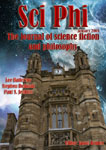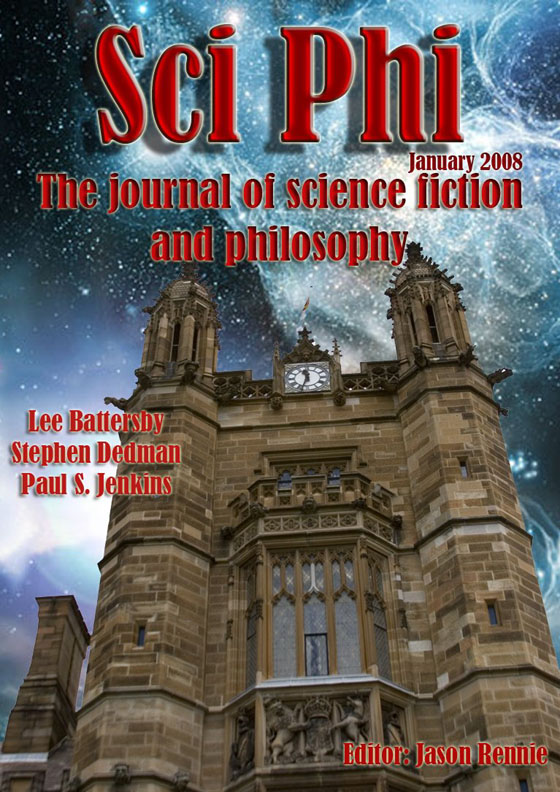
 Sci Phi: The Journal of Science Fiction In Philosophy – January 2008 (Volume 1 Issue 1)
Sci Phi: The Journal of Science Fiction In Philosophy – January 2008 (Volume 1 Issue 1)
Edited by Jason Rennie; Read by various
11 MP3s and PDF – Approx. 3.5 Hours or 33,000 Words [PHILOSOPHICAL JOURNAL]
Publisher: Sci Phi Productions
Published: January 2008
Themes: / Philosophy / Science Fiction / Religion / Fantasy / Cloning / Time /
“Sci Phi is a new popular level journal aimed at readers who like science fiction but want to think about its implications a little more. Each issue of Sci Phi will contain short stories and articles. The short stories will tend to have an interesting idea underlying them and the articles will look at various philosophical ideas through the lens of science fiction. Each issue comes in various ebook formats as well as all of the stories and articles in mp3 format for your listening pleasure. Each issue costs $7, and all of the contributors are paid on a royalty basis, with about 80% of the issue price being paid directly to contributors. Additionally after one year each issue of the journal will be released under a Creative Commons attribution non-commercial license 3.0.”
The Journal of Science Fiction In Philosophy is a spin-off from the Sci-Phi Show podcast. The short introductory editorial, written and read by the journal’s editor Jason Rennie, defines what the journal will be about using examples from film and television – but despite these examples the stated focus is on making the journal more focused on the literary side of Science Fiction.
Next up, “What Is Sci-Phi” (introductory article) by Jason Rennie; read by TD-0013, introduces the philosophical content of modern Science Fiction. The stories are followed by “questions for reflection” which are a series of questions designed to provoke the philosophical spirit in the listener.
“Irwin Goes To Hell” by Jason Pomerantz is the first piece of fiction in the journal; it is a humorous and surrealistic tale of a hapless suitor determined to break all ten of the Ten Commandments. But the joke runs a little long with so many commandments to break and so many trips to hell (and heaven).
Geoffrey Maloney‘s “The Oracle In The Red Limousine,” read by Nathan Lowell, the next short story, offers a small reflection on the idea predestination and a large handful of humor.
“Requiem for a Harlequin: Two Perspectives on Time, and a Celebration of Kairos, in Three Stories by Harlan Ellison” by Michael Spence is a commentary on what he sees as a previously unnoticed theme in Harlan Ellison stories. Warning, pre-reading of the three Ellison tales is definitely required.
“You Pretty Thing” by Lee Battersby (and read by Rick Stringer) is short, unmemorable, fleeting. This, despite having some weighty ideas (life after death, cloning, consciousness-downloading).
“Requiem for a Silent Planet” by Stephen Dedman, read by TD-0013, stands out (with lines like “I’m loaded for pope.”. This one is an intriguing listen right up until its very abrupt end. This story feels terribly unfinished – which is a real shame.
Likewise, the serialized piece “The Big Questions” by Stephan Vladimir Bugaj and Ben Goertzel, read by Jeffrey Kafer, starts with a moon-smashing bang. It is a snappy first person tale of a head in the clouds solipsist asking many of the traditional questions of metaphysics – many questions, few answers – perhaps some will come in future issues of the journal.
“A First Look at Lookism” is an article with an argument at its center. The subject of which is an exploration of the “morally inappropriate discrimination,” phenomenon of visual discrimination. The author, Ryan Nichols is an assistant professor. He examines the moral status of lookism with special reference to a piece of literary science fiction (namely Ted Chiang’s Liking What You See: A Documentary). Nichols surveys the terrain and then mulls over an argument that he thinks may show precisely why lookism is so wrong. He’s thorough and the article runs about 25 minutes.
Next, “The Losting Corridor” by Matt Wallace, read by Drew Beatty, offers a dreamy entrance into a Twilight Zone-like world. A hardboiled detective on the trail of a shooter winds up in a Platonic blind-alley that he may never escape from. The tale is gritty and well written, but ultimately it is a shallow mirror pointed at a past that never was.
Finally, the issue is capped by “The Epilogue” which is, despite its title, actually a fiction piece. It’s an eight minute tale, by The Rev-Up Review‘s Paul S. Jenkins. A cryptic worldwide broadcast by an anonymous grey-bearded sky guy proves once and for all that the atheists were wrong, and will be right. Well written, but more of an exercise in storytelling than a story.
Magazines by their nature are extremely hard to review (their many small components needing to be examined in detail). There is something in the essential character of magazine reading that is always more ephemeral than novels or short stories alone. That said, after reading over what I’ve written above, it appears I have been more damning than praising – had I been merely a casual reader looking for something to listen to I bet I’d have been far less so. So let me clarify, for the first issue of a magazine the Sci Phi: The Journal of Science Fiction In Philosophy – January 2008 is extremely well put together. It doesn’t have any real dead weight, and I eagerly look forward to listening to future issues.
Posted by Jesse Willis








